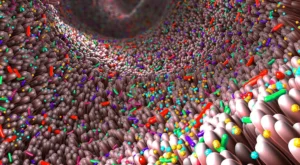Last Modified:
Gas, bloating, or an upset stomach are common indicators of poor digestion. There are many foods that upset the digestive system, whether that’s by allowing stomach acid to flow back up into the esophagus, altering the speed of your digestive processes, or causing an excess of gas to build up in your gut. Some foods may have a negative impact on your gut’s microbiome—the composition of bacteria in your intestines—which can lead to poor digestion.
This article will discuss types of food that are hard to digest as well as ways to improve your digestion.
8 Worst Foods for Digestion
Certain types of food can be harmful for your digestive system and your gut microbiome. The following food categories are either hard for your body to process or irritate your digestive tract in some way.
1. Processed Foods
Highly processed foods tend to lack fiber and essential nutrients that aid digestion. Artificial ingredients—colors, sweeteners, and preservatives—may also be problematic, especially for individuals with sensitivities to those items. Some sweeteners are difficult to digest if consumed in large amounts, so just because a food’s packaging says it’s “sugar free” doesn’t mean it’s good for you.
2. Fried or Fatty Foods
Fried or fatty foods (burgers, chips, etc.) can be difficult for your body to process properly. They can either slow digestion—leading to constipation—or move too quickly through the digestive tract, resulting in diarrhea. One overview of various studies reported that fatty foods may lead to dyspepsia (indigestion) by contributing toward abdominal bloating.
3. Sugary Foods
Eating too much sugar and/or processed carbohydrates can promote the growth of bad bacteria. This bacterial imbalance, which is termed dysbiosis, can lead to digestive problems such as gas, bloating, diarrhea, constipation and abdominal discomfort. Diets high in sugar promote the growth of unfavorable bacteria, which can lead to a myriad of health problems. As such, reducing sugar in your diet may be a good idea if you experience chronic indigestion.
3. Salty Foods
A diet high in salt may also have adverse effects on your digestive system. One study published in Frontiers in Microbiology showed some evidence that high salt consumption could alter the composition of the microbiome in your gut while also affecting the absorption of dietary proteins. Not only could this lead to indigestion, but it may also contribute toward general health problems.
5. Acidic Foods
In some people, acidic foods such as tomatoes, citrus, soda, spicy foods, and chocolate can cause stomach irritation which results in digestive problems. Some people may be more sensitive to acidic foods than others, so you should gauge your own level of tolerance for these foods.
Keep in mind that not all acidic foods are bad for you. Many contain important nutrients and can therefore be a healthy part of a balanced diet. The key, of course, is to make sure that diet is balanced by not overdoing it.
6. Caffeine
Caffeine-heavy drinks and foods may trigger your gastrointestinal tract to move its contents more quickly than normal. This means consuming caffeine in excessive amounts could lead to digestive problems such as diarrhea. That said, if you’re constipated, this very function may be helpful, so it really depends on your particular situation.
7. Alcohol
Alcohol is well known for the effect it can have on your liver, but it can also be harmful to the lining in your stomach. Excess alcohol consumption can irritate the lining of the stomach, which can alter the acid/base balance and allow unfavorable bacteria to proliferate, leading to intestinal problems.
8. Dairy
Finally, many people have a hard time digesting dairy. Many people have difficulty breaking down lactose, which is also called milk sugar. This can cause symptoms such as bloating, gas, diarrhea, etc. While not everyone has this reaction, it’s still important to avoid excessive dairy consumption since it’s also high in fat. Too much fat and lactose may overwhelm your digestive system, even if you’re not lactose intolerant.
A Quick Note on Fiber and Digestion
Humans do not have the enzymes required to digest dietary fibers. Hence, dietary fibers pass through the digestive tract unaltered. However, when they reach the colon, dietary fibers are the ‘food’ for your probiotic bacteria.
Probiotic bacteria ferment dietary fibers in the colon and convert them into compounds called postbiotic metabolites, which have a wide range of health-regulating compounds. In fact, postbiotic metabolites have been referred to as the new frontier in microbiome science.
FAQs on Food and Indigestion
What causes poor digestion?
Poor digestion can be caused by a number of factors including taking antibiotics and even anatomical problems, which may allow stomach acid to move back up into the esophagus. Also, many people do not produce enough stomach acid (hypochlorhydria), which can cause poor digestion. Finally, there are many diet and lifestyle factors that can also contribute to digestion problems.
What is the hardest food to digest?
Fatty, fried, or sugary foods are often difficult for the body to handle, so it’s best to consume them in moderation.
What helps digestion after eating?
Fiber and fluids can help with digestion after a meal, as can avoiding processed, sugary, or fatty treats
How to Improve Digestion
Americans consume vast quantities of fast foods and highly processed foods, which explains why so many people suffer from digestive problems and intestinal complaints.
Eating a diverse plant-based diet is the key to creating and maintaining a healthy gut microbiome, and healthy digestion.
Dr. Ohhira’s probiotic supplements, which contain over 500 postbiotic metabolites, can help rebalance the composition of gut flora in order to help improve digestion. To learn more about Dr. Ohhira’s Probiotics, contact Essential Formulas today.





